Religions for Peace and UNHCR present the
Multi-Religious Council of Leaders
Faith communities have long offered sanctuary to refugees in their journey to safety, as first responders meeting protection or service delivery needs and supporting communities to find solutions such as private sponsorship programmes. This commitment comes from religious teachings, as well as a long-term commitment to upholding human rights.
To foster greater collaboration with religious leaders in the build-up to the Global Refugee Forum in 2023, Religions for Peace and UNHCR formed a multi-religious council of leaders to strengthen collective efforts from religious leaders across regions and faiths to address root causes by supporting global advocacy, conflict prevention, reconciliation, peacebuilding and social cohesion initiatives.
The Global Compact on Refugees describes faith-based actors and organisations as contributors to good relations and peaceful coexistence between refugees and host communities. It emphasises their potential role in addressing root causes through supporting conflict prevention, reconciliation, peacebuilding and social cohesion.
The Global Compact on Refugees aims to strengthen the international response to large movements of refugees and protracted refugee situations. It recognises faith leaders and faith-based organisations as contributors to good relations and peaceful coexistence between refugees and host communities.
The multi-religious group of faith leaders brought together by Religions for Peace and UNHCR have committed to mobilising action for refugees, asylum seekers, stateless and internally displaced people addressing root causes of forced displacement, and facilitating the meaningful participation of forcibly displaced women and girls in peacebuilding processes.
“As wars, conflict, and persecution continue to force people to flee their homes, we seek the support of faith leaders and their communities. They are key in not only standing with and supporting refugees during their displacement but in addressing the root causes that gave rise to their flight.” -UN High Commissioner for Refugees Filippo Grandi
The Members of the Council
The Council comprises 20 religious and spiritual leaders, and their mandate extends until the second Global Refugee Forum in 2023, where they will present their achievements and seek further commitments to action from a broader range of religious actors and institutions.
Members of the Council were identified based on having served as strong advocates for conflict prevention, reconciliation and peacebuilding in humanitarian and forced displacement contexts.
At the Council’s inaugural meeting on 13 April 2021, members of the Multi-Religious Council of Leaders made individual commitments to promote Peace and offer support to forcibly displaced people, including participating in advocacy and promoting greater access to education, housing and mental health services.
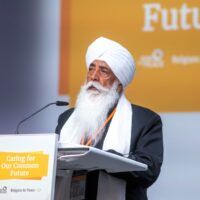
Bhai Sahib Mohinder Singh
H.E. Bhai Sahib Mohinder Singh is the Spiritual Leader and Chairman of Guru Nanak Nishkam Sewak Jatha, UK–a charitable organisation with its Headquarters in Birmingham. It has two sister organisations in Leeds and London with branches in India and Kenya.
“More resources and opportunities are needed in countries where displacement is occurring. We cannot just tackle the problem of displacement. We must attempt to eradicate the reasons for the displacement in the first place. Global issues require global solutions, not band-aids. We need to:
- Encourage world Governments to implement the Sustainable Development Goals;
- Educate and make welcoming / hosting refugees a positive initiative;
- Create ambassadorial/champion roles in localities;
- Change the language from ‘them’, ‘illegal people’, ‘immigrants’, ‘migrants’ – the labelling dehumanises our human family
- Support and promote collaboration between faith communities, civil society and academic institutions to encourage collaboration and dialogue/participation with local/national governments.”
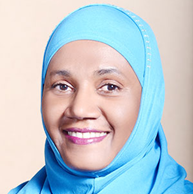
Nageeba Hassan Tegulwa
Ms. Nageeba Hassan Tegulwa‘s passion for peacebuilding and women’s involvement in peace making, has led to successful global gender initiatives, including the incorporation of women’s desks in the constitutions of both UMSC and IRCU.
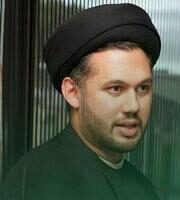
Sayed Ali Abbas Razawi
Imam Dr. Sayed Ali Abbas Razawi is a British scholar and religious leader with a research interest in Islamic philosophy, mysticism, and comparative religion.
“Our vision together is that women, children and men are protected, find safety and support, have their human rights and dignity respected and achieve their full potential. We seek to co-ordinate and promote action by faith communities in Scotland to support asylum seekers and refugees, and work with Christian, Jewish, Muslim and Interfaith groups.”
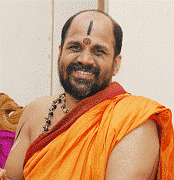
Shri Shri Sugunendra Teertha Swamiji
Shri Samir Somaiya is the chairman and managing director of Godavari Biorefineries Limited and chairman of the Board of Trustees of Somaiya Vidyavihar and The Somaiya Trust.
“It is said, Guests are like God. God will come as a guest. If we treat them like God then God is going to bless us. In the form of refugees God is coming to us.”
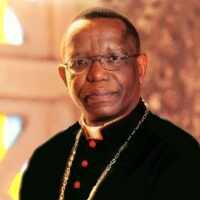
Archbishop Buti Tlhagale
Archbishop Buti Tlhagale is a UNHCR high-level supporter, Southern African Catholic Bishops’ Conference (SACBC) Liaison Bishop of Migrants and Refugees, and First Metropolitan Archbishop of Johannesburg.
“Welcoming people, especially in the context of migrants and refugees means making them feel at home. Welcoming people take different forms. When refugees come to a country for the first time, they usually need food, accommodation, and need practical things. But as time goes on, they need documentation from the home affairs and need their children to be in school. Welcoming people means showing the best values which we have embraced. We welcome people because we too would like to be welcomed if we were in a different situation. Welcoming is a blessing we can always give to others.”
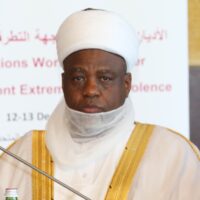
Sultan Muhammad Sa’ad Abubakar III
Sultan Sa’ad Abubakar is the Sultan of Sokoto in Nigeria, a position considered to be the spiritual leader of Nigeria’s ummah, which comprises roughly half of the country’s citizens of faith.
“We pray for peace, stability and progress for the whole world. As one of the co-presidents of Religions Peace, I am committed to tackling forced displacement and promoting peaceful coexistence in Nigeria and in the world.”
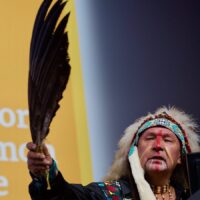
Grand-Father Dominique Rankin
Born in the forests of Northern Québec, Grand-Father Dominique Rankin, an Algonquin Native American, was chosen when he was seven years old to succeed his father as chief and medicine man. He comes from Abitibi and was once Grand Chief of the Algonquin Nation.
“Refugees, similarly to my people, were forced to leave their homes and now hope to find peace again. We should welcome our neighbours, as the only solution to wars and suffering is to live and work together as one.”
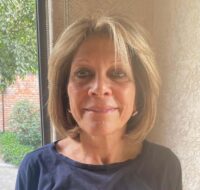
Ms. Malka Ibitzki
Ms. Malka Ibitzki, Secretary General-elect, Inter-Religious Council of Mexico (CIM); Member, Israelite Tribune, Branch of the Central Committee of the Jewish Community of Mexico, Religions for Peace, Mexico
“We should try to invest in education to prevent the increase of violence and exploitation against migrants and refugees, particularly against women and girls. Mexico welcomes refugees and refugee children from Latin and Central America. Violence has increased in the past years because these people are not taken care of by the government. Many displaced people stay in Mexico, so we should invest in education for all these migrants and refugees, so that they can build better futures.”
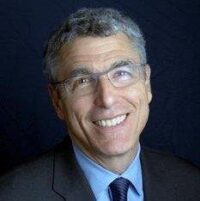
Rabbi Rick Jacobs
Rabbi Rick Jacobs is president of the Union for Reform Judaism, the congregational arm of the Reform Jewish Movement in North America.
“We need to say ‘humanity first’, loudly and clearly. We have to raise our religious voices together. The job of religious leaders is to act together and to act globally. We must work collectively to change one heart at a time.”
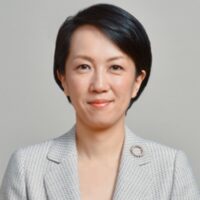
Rev. Kosho Niwano
Rev. Kosho Niwano serves as a Co-Moderator and Executive Committee Member of Religions for Peace.
“Buddhism teaches us that our existence is sustained by the existence of others. We are all interconnected. If refugees are suffering, then we Buddhists are suffering too.”
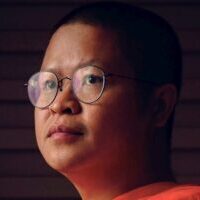
The Venerable Phra Medhivajirodom
The Venerable Phra Medhivajirodom is a UNHCR Patron for Peace and Compassion and Founder of Vimuttayalaya Institute.
“As a member of the Multi-Religious Council of Leaders, I commit to promote the idea of “We are One, We are World” to create solidarity, loving, kindness, and to prevent polarization and discrimination among refugees, Internally Displaced Persons and stateless people. We belong to the same family, which is a family of humanity.”
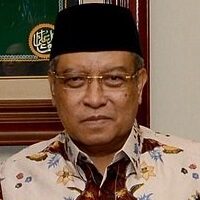
Said Aqil Siradj
Dr. Said Aqil Siradj is an Indonesian Islamic scholar and the current chairman of the executive council of Nahdlatul Ulama (NU), the largest Islamic organisation in the world.
“There is no violence in religion (Islam), we do reject any violence, because a call to change requires dignified discussion. The Prophet Muhammad has told us that we must not fight each other regardless of our differences. Religious leaders have a common duty to guide their communities to welcome their neighbours, to build and maintain peace..”
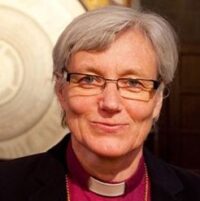
Archbishop Dr. Antje Jackelén
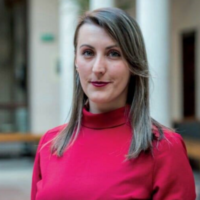
Ms. Emina Frljak
Ms. Emina Frljak is the Program Coordinator of Youth for Peace in Bosnia and Herzegovina. She is a Master’s student at the University of Sarajevo.
“We, as a community of people from diverse religious traditions committed to ensuring respect for human dignity, can set an example and share a message based on human rights to create a strong platform to connect with people around the globe. We must not forget that spiritual values of some kind drive 80 per cent of people in the world, and here we have a strong group of people who can appeal to those values and generate empathy for people on the move.”
I commit myself to participate in our Council actively and bring youth voices to our work. It’s important that together we appeal to people of faith and encourage them to rethink their approach to people on the move, raise awareness about how migrations affect people, start volunteering within their communities and start speaking out for those who are voiceless. Our Council has the unique multifaith, multinational and multistakeholder advantage that needs to be utilized. The help of UNHCR is crucial in spreading our message and mobilizing communities and governments worldwide.”
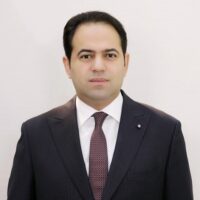
Judge Mohamed Abdelsalam
H.E. Judge Mohamed Abdelsalam is the Senior Representative of His Eminence Grand Imam of Al-Azhar, Secretary-General of the Muslim Council of Elders and Co-President of Religions for Peace.
“Islam calls upon us to support and stand by refugees. Prophet Mohammed helped and stood by those who sought his refuge until their rights and homes were returned. Islam has many provisions for the well-treatment, backing, and hosting of refugees.”
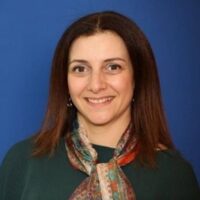
Dr. Nayla Tabbara
Dr. Nayla Tabbara is the President of Adyan Foundation and previously served as director of its Cross-Cultural Studies Department.
“Religious leaders need to contribute, given their social and religious responsibility, to an honest description of the asylum situation in Lebanon and build their narratives on human dignity and other common humanitarian factors.”
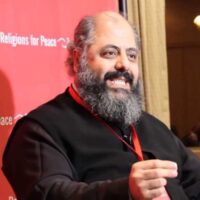
Bishop Elias Toumeh
H.E. Bishop Elias Toumeh is the Greek Orthodox Bishop of Wadi Nasara.
“The role of religious and social leaders is to support the state and contribute in establishing peace, leadership, and protection. Prevention is better than treatment. Therefore, we must spread the culture of peace and love to change the situation that is taking place today due to poverty and distress afflicting people.”
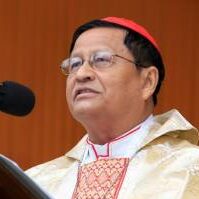
Cardinal Charles Bo
H.E. Cardinal Charles Bo was elected the president of the Federation of Asian Bishops’ Conferences (FABC) on 16 November 2018.
“In these dark times, we hear the voice of the lord to call on the churches to be an instrument for justice and peace, and reconciliation; to be his hands and feet and provide assistance to the poor and those in fear, to counter hatred with love. (…) We pray for a new world, where truly every human being have an equal status, equal rights and basic freedoms, where ethnic and religious diversity is celebrated and where we enjoy real peace.”
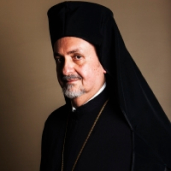
Metropolitan Emmanuel Adamakis
H.E. Metropolitan Emmanuel serves as a Co-Moderator and Executive Committee Member of Religions for Peace.
“It is a commitment not to make any difference between those who are Muslim or Christians or Jews or Buddhists or those who live in areas where we need the peaceful coexistence, as we look for living experience to live in peace and to respect the common citizenship. If we have the wisdom and have love for each other, and therefore, we are looking for peace with hope, we can have true common citizenship, in which we look at each other not as different, but as people of this world, men and women of different faiths who can share the peace in earth as it is in heaven.”